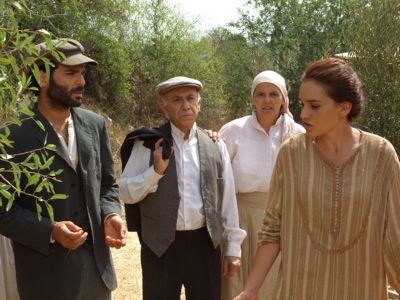January 26, 2011 by Amy Kronish
Feminists in Focus: Valley of Fortitude (Gei Oni)
Dan Wolman’s newest film, Valley of Fortitude (Gei Oni), is a literary adaptation that combines history and romance
 Dan Wolman is one of Israel’s veteran artistic filmmakers. Since his early literary adaptation, My Michael, based on a novel by Amos Oz, he has produced only auteur films (scripted and directed by the filmmaker). His latest film Valley of Fortitude (Gei Oni), which recently opened in theaters in Israel, is another adaptation, based on the best-selling historical novel by Shulamit Lapid.
Dan Wolman is one of Israel’s veteran artistic filmmakers. Since his early literary adaptation, My Michael, based on a novel by Amos Oz, he has produced only auteur films (scripted and directed by the filmmaker). His latest film Valley of Fortitude (Gei Oni), which recently opened in theaters in Israel, is another adaptation, based on the best-selling historical novel by Shulamit Lapid.
The story takes place during the late 19th century, a period of Jewish history in which waves of Jewish migration left Russia and the Ukraine mostly for America. A smaller number of immigrants went to Palestine.
Combining the historical narrative with a love story, the film tells the story of Fanya (Tamar Alkan), a young woman who arrives on the shores of Palestine with a little baby, accompanied by her aging uncle and her emotionally scarred brother. They are running from Russia, having lost all of their family in a terrible pogrom.
Fanya meets Yehiel, a pioneering farmer who has recently lost his wife to malaria and is looking for a mother for his two little children. Although she is harboring a terrible secret Fanya agrees to marry Yehiel. She has no real choice. In order to provide a home for her little baby and for her brother, she follows him to his small community in the Lower Galilee (which will eventually become Rosh Pina) and cares for his children.
The narrative of the film is reminiscent of another Israeli historical film that takes place during the same time and place – They Were Ten (1960) directed by Baruch Dienar. Both films deal with the hardships from the point of view of the female character, who is required to make so many sacrifices for this way of life. The pioneers are forced to learn to get along with the local Arabs when, during a period of serious drought, they go to draw water from their well. In the current film, however, the burden of drawing water falls on the shoulders of the women, who thereby become the go-between with the local population.
According to film critic Uri Klein (Ha’aretz), the fact that the film is a period piece creates a discourse between the period in which the film was made and the period that it depicts: “Wolman does not let the fact that this is a period piece take over the film… He focuses on representing the physical surroundings – the stone houses, the landscape, and the fields of wheat – but the atmosphere creates a link between the period in which it was produced and the period that it represents.”
Survival in the pioneering world of those years required that a woman be strong and capable. Dan Wolman, however, creates a character that is so much more — he succeeds in breathing life and warmth and personality into the Fanya character. Through her own inner strength, the warmth of her welcoming neighbors, her growing connection to their life of cultivating the land and the love and understanding she receives from Yehiel, she is able to rebuild her life and cultivate her capacity to love. In a time when women were not really equal in society, this is a woman’s film, focusing on one woman’s strength in the face of much adversity.
This historical piece beautifully reflects the period which it portrays. It is slow-paced, yet sensitive, beautifully directed and acted, and a true pleasure to watch – a small piece of our Jewish past. It is a triumph for its lead actress and for its director, one of Israel’s most sensitive and substantive filmmakers. Read the praise from another critic in the Israeli Hebrew press, Yoram Kaniuk (The Marker Café): “It unfolds before your eyes, it is believable and sad and optimistic and pessimistic and it is the most beautiful love story I have seen in the last few years… Wolman does not run, he lets things happen quietly and wisely and the film aside from being a small masterpiece is the film of Tamar Alkan who came to us out of nowhere and I could not for one moment help but be moved by the beauty of her acting and her gentle strong power.”
Valley of Fortitude (Gei Oni) is available directly from the filmmaker, Dan Wolman.
–Amy Kronish blogs at www.israelfilm.blogspot.com
 Please wait...
Please wait...